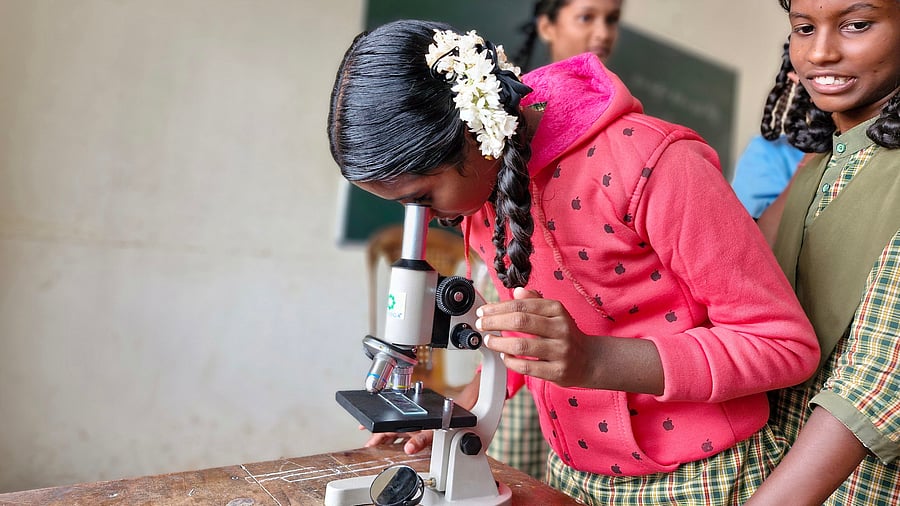
Credit: Special Arrangement.
A state-of-the-art laboratory with high-tech equipment such as gas chromatographs and element analysers. Lab coat-clad students engaged in various activities under the guidance of senior researchers. This is what a typical summer day looks like in the chemistry lab of the Prayoga Institute of Education Research, a nonprofit organisation based in Bengaluru.
“I am interested in chemistry. Our school has a lab, but they do not really allow us to use it. Here, we can research and experiment. This is a very good opportunity for me to do hands-on experiments,” says Glory, a Class 9 student from a school in Dakshina Kannada district.
She is one of the 50 students chosen for Prayoga's free programme, Anveshana, which promotes science research among students from classes 9 to 12. This year’s batch is working on 16 research projects in life sciences, physics, chemistry and other subjects.
The programme focuses on research involving real-life issues. It has produced research that has been peer-reviewed and published in 11 international publications meant for young researchers.
Students are selected for this summer programme after an application and an acumen test.
Nimish, a Class 11 student working on a life science project, says the programme made him confident about a future career in research.
Asha K H, a senior researcher who mentors the children during the process, says they needed guidance only in the beginning, and now they do not need any handholding.
Prayoga aspires to reach 22,000 students across Karnataka in the next five years through another flagship programme, Kriya, which trains teachers to impart experiential learning.
Through the programme, teachers are re-oriented to teach more experientially, and lab stations with equipment are given to schools free of cost. This includes all types of schools across Karnataka, including Karnataka Public Schools and other government schools.
“I teach classes 6 and 7. Children are very interested and curious. Every day, they ask me if there are lab classes. They are scoring well in science as well,” says Tilak Ganapathi Nayak, a science teacher from Government Higher Primary School, Aghanashini in Kumta taluk, Uttara Kannada district.
Tilak attended his first training organised by the Department of State Educational Research and Training (DSERT) in collaboration with Prayoga in 2023, and has taken five trainings since then. “Our classes are monitored by academic coordinators, and the changes among children are documented,” he says.
His school has three lab stations, which include lab equipment, tables and books for all students. The school also organised workshops for teachers and students from neighbouring villages, who are now curious about the programme.
The goal
Nestled amid nature against a hillock in Ravugodlu village off Kanakapura Road, the main Prayoga building is designed to represent the Fibonacci sequence, a basic concept in mathematics, evidenced in patterns in nature.
Currently, Prayoga is working with 55 schools and has trained more than 200 teachers to become facilitators in science, technology, engineering and mathematics (STEM). “We will be adding 12 more schools this year,” says H S Nagaraja, an 82-year-old academician and the founder of Prayoga.
“I worked as a physics lecturer all my life. In today’s age, information is abundant, but practical knowledge is non-existent. Children should ask questions and find answers for themselves. Our rote learning system does not enable this. The way we teach science should be changed in this era. This thought prompted the origin of Prayoga,” he adds.
“Today, a child who breaks a test tube in the laboratory is penalised. Where do kids gain the courage to experiment?” he asks, emphasising the need for freedom to make mistakes and learn from them.
“We want to generate enough data for policymakers to intervene in the way science is taught,” says Vallish Herur, managing trustee of Prayoga, who was also a National Curriculum Framework Drafting Committee member. Kriya is in alignment with the National Education Policy, and the lessons align with the NCERT textbook and the Karnataka state syllabus, he adds.
The data generated from the programme is documented, and observations are made about how children from various socioeconomic backgrounds and rural and urban environments learn science, which can be valuable for future interventions.
“In India, we do not have competency mapping for learning at a granular level. The learning curves vary among children based on the environments in which they grow. Our programme will help generate the data that will identify gaps in learning,” says Vallish.
“We are also experimenting with how science can be taught along with sports,” says Vallish. Prayoga has collaborated with a nearby sports school on a programme called Krida. Summer camps focused on the theme are also conducted.
Education research generally finds few funders because there is no tangible, immediate output. Currently, the programmes are being run with corporate funding, and the government supports them by providing access to schools, says Vallish.